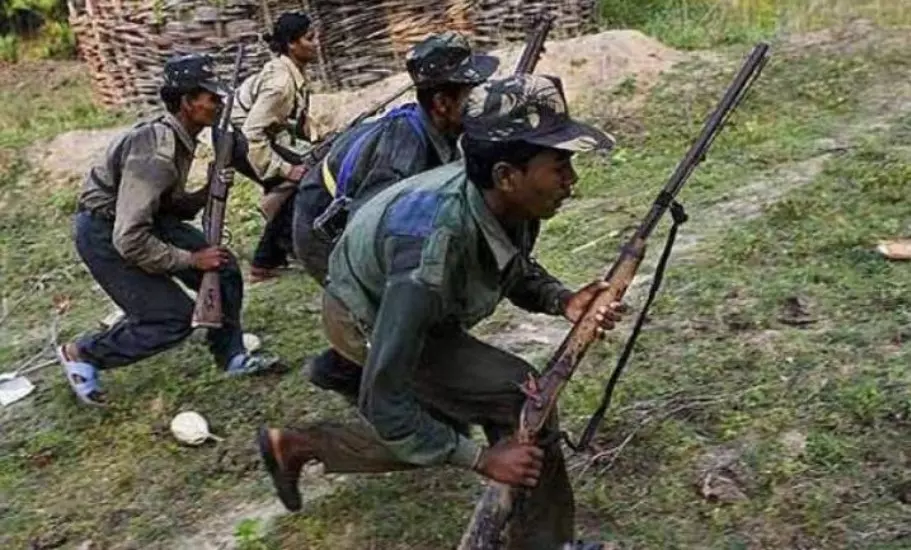
Maoist Gowda’s death sparks fury amid charges of cold-blooded murder
Activists and former Naxalites question the necessity and transparency of the police action, given the reduced Naxalite activity in the region in Karnataka

Was Naxalite Vikram Gowda, who was onthe run for 20 long years, killed in cold blood by security forces who claimed he died in a gun battle? No, says the Karnataka government. But activists and ex-Maoists insist he was caught and shot dead.
Amid the conflicting claims, the truth may be a casualty.
Gowda, who was wanted in two states, including Karnataka, was said to have been killed in an exchange of fire on November 18 night with security forces in a village in Udupi district when he reportedly was trying to get groceries.
CM defends police
Responding to criticism of wanton murder, Chief Minister Siddaramaiah defended the police action. "Vikram Gowda was wanted in several Naxal cases. He was killed in an encounter as part of efforts to curb Naxalite activities."
He said Gowda was a key figure in Naxalite operations. The Kerala and Karnataka governments had announced rewards of Rs 25 lakh and Rs 5 lakh respectively for his capture.
The Anti-Naxalite Force (ANF), which claimed the killing, says Gowda was shot dead in self-defence.
Questions over killing
Among former Naxalites and activists, there are few takers for this version. Some want a judicial inquiry into the death of Gowda, a school dropout from an impoverished family who was once a worker in a small hotel.
Also Read: Left bleeding in Kerala, CPI(M) is struggling to reinvent its mojo
Activists have questioned the necessity and transparency of the police action, particularly given the reduced Naxalite activity in the region.
Social activist Navin Soorinje expressed concern about the alleged “encounter”, a police euphemism for a gunfight, suggesting the police could have arrested Gowda instead.
Mystery over arrests
He said a trained force could have apprehended him. He also criticized the lack of transparency about earlier arrests of Maoists in Chikkamagaluru which have contributed to the mystery over Gowda’s death.
A week ago, the police reportedly claimed that two or three suspected Naxalites had been arrested in the Chikkamagaluru area. But no official records speak of these arrests.
Speculation is rife among progressive circles that Gowda might have been detained and possibly killed in a staged encounter.
Rehabilitation or ‘encounters’?
Former Naxalite Noor Sridhar condemned Gowda’s killing as a "heinous injustice" and accused the government of undermining its surrender programme for Maoists.
He questioned the government’s contradictory approach of promoting rehabilitation of surrendered Naxalites while at the same time orchestrating “encounters”. He sought a FIR and a judicial probe into the death.
Writer K Sridhar emphasized the need for a return to a dialogue with the Maoists, citing earlier efforts by civil society leaders like Gauri Lankesh.
Dwindling Naxalite strength
"We must hold the government accountable for this gross human rights violation. Civic society has a responsibility to ensure justice and prevent further bloodshed," he said.
Activist Nagaregere Ramesh told the media: "We understand the struggles and dreams of forest companions, but violence is not the answer. It is time to build a united people's movement."
Critics also wondered why the police had resorted to killings when Naxalite activists have dramatically dwindled in Karnataka and the numerical strength of the Maoists has fallen to no more than a dozen.
Naxalites on the retreat
“This raises questions about adherence to due process and the rule of law,” said a critic who did not want to be identified by name.
According to a former Naxalite, just two to seven to eight Maoists were now active in Karnataka, including Mundagaaru Latha, Sundari, Jayanna, Meena, and others.
Informed sources say even these have largely kept away from Karnataka and are holed up primarily in the forested regions of Wayanad in Kerala.
Maoists and Western Ghats
But an ANF official told The Federal on the condition of anonymity that Latha, Gowda and others had recently resurfaced near Karnataka's Western Ghats.
This resurgence is reportedly linked to an incident in Wayanad involving the Kerala Police in February 2024.
Despite these assertions, progressive thinkers argue that the possibility of active Naxalite activity in the region is slim. They say the surviving Naxalites may simply be using the Western Ghats as a hideout to evade the police, without organizing any major movements.
Police firm on official version
"If they were active, they would have circulated pamphlets," said a source who keeps a tab on Maoist movements.
But senior police officer Pranab Mohanty of the Internal Security Division insists that Gowda was killed in a gun battle and that weapons were found at the site.
The activists are equally convinced that Gowda's killing is part of a larger pattern aimed at suppressing democratic movements, particularly those involving triabls.
Allegations of high-handedness
Former Naxalite Sirimane Nagaraj blamed systemic issues for pushing tribal youth toward extremism, citing harassment by government agencies and denial of access to forests.
He said: “Malnad (area) is not Naxalite-affected as is made out to be. It suffers from oppression by the forest and revenue department officials. Continuing injustice will frustrate more youths."
Humane approach needed
Gowda’s killing has put the government in a tight spot, with critics accusing both the BJP and Congress administrations of using “encounters” as tools of political convenience.
“Whether the encounter was legitimate or not, it underscores the need for a more transparent and humane approach to addressing such issues in a democratic society," said activist Soorinje.
